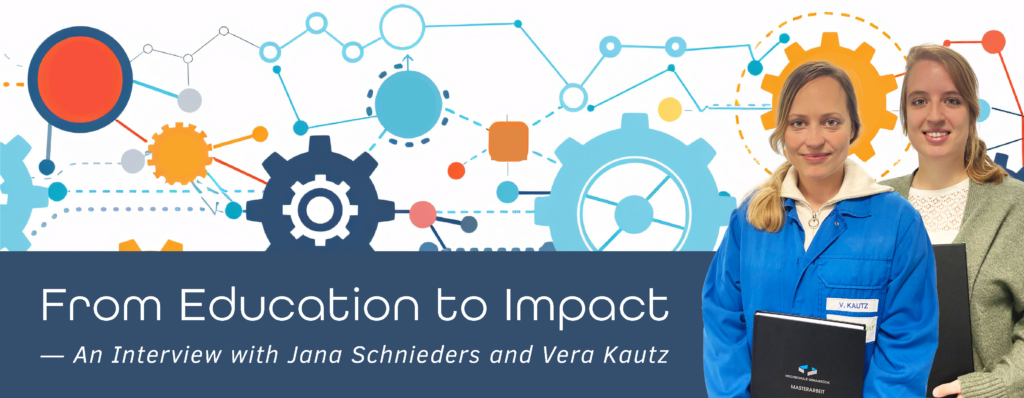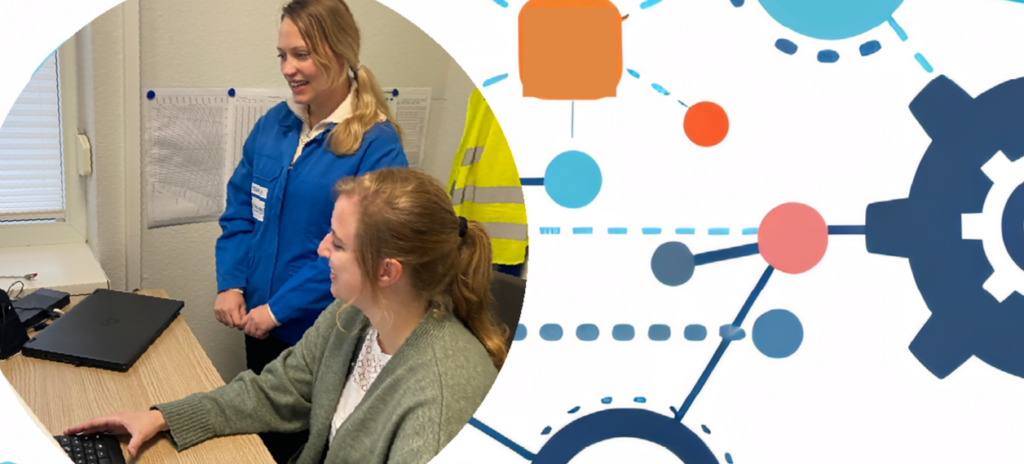From Education to Impact: An interview with Jana Schnieders and Vera Kautz

Continuing education plays a crucial role in professional development, as it offers individuals the opportunity to expand their skills, keep up to date with advances in the industry, and make meaningful contributions to their work. Balancing education with a full-time job can be challenging, but it often leads to
significant benefits both personally and professionally.
Jana Schnieders and Vera Kautz are two professionals who have done just that. While working at Emsland Group, they have completed their master’s degrees and applied their academic work directly to practice in the company. Their final theses focused on optimizing energy efficiency and improving production processes. Their journey highlights the practical value of continuous learning and its impact on day-to-day operations.
Meet the Professionals: Jana Schnieders has been working in the field of process engineering for two years, where she focuses on the conceptual design, planning and implementation of projects with a focus on energy issues. Vera Kautz has been a process technologist for three years and specializes in the analysis and optimization of production processes as well as the execution of cross-plant trials.

Why did you decide to pursue a career in process technology and engineering?
Vera & Jana: Both in process technology and in process engineering, there are a variety of exciting and diverse tasks that constantly present you with new challenges. This allows us to continuously develop both professionally and personally.
How did the Emsland Group support you during your master’s program?
Vera & Jana: The mental support we received from our supervisors and colleagues, along with the opportunity to organize our time flexibly, contributed significantly to the successful completion of our master’s programs.
Why did you decide to write your master’s thesis internally at the Emsland Group, and how did the company facilitate this process?
Jana & Vera: We decided to write our master’s thesis internally at the Emsland Group because the company offers a wide range of complex topics that are ideal for a thesis. This variety of topics allows us to delve deeply into specific subject areas and work on practice-relevant issues.
Another decisive factor was the flexible working hours and the excellent support provided by our personal supervisor Florian Schmidt-Hickmann. Florian’s support not only helped us develop professionally, but also motivated and inspired us. In addition, the helpfulness of all departments was remarkable. Whether we had technical questions, needed methodological support or simply needed advice, we were always able to rely on the expertise and support of our colleagues.
What was the focus of your master’s thesis?
Jana: My thesis was about optimizing waste heat utilization at the Emlichheim plant. I developed concepts to expand the current use of waste heat, which is crucial for improving energy efficiency and reducing CO₂ emissions. This project is directly linked to the company’s sustainability goals.
Vera: My final thesis was about the conception of a new storage system for propylene oxide in order to avoid production delays and to increase the production of starch ethers. The aim was to redesign the outdated storage system and thus improve the overall efficiency in the production process.
How was your final thesis implemented at the Emsland Group?
Jana & Vera: The concepts of our theses lay the foundation for further planning and implementation. These are designed in such a way that they can be directly incorporated into a project. The project phase can largely proceed with the detail engineering.
What do you think contributed to your academic success (Jana: 1.0, Vera: 1.5)?
Jana & Vera: Our success in the master’s programs is mainly due to the high level of practical relevance that we have gained through studying and working at the same time. We were able to incorporate practical problems directly into the theory, which made the content more understandable and tangible for us. This close integration of theory and practice helped us to better internalize and apply the course content, which ultimately contributed to our above-average grades.
What do you think of the professional development and opportunities for employees in the technical areas of the Emsland Group?
The Emsland Group supports the further education of its employees in technical fields by offering them the opportunity to receive targeted support through training courses and further education. In addition, the company offers an exciting range of tasks with a wide variety of projects and innovative technologies, enabling employees to take on responsibility at an early stage and gain practical experience.
Want to discover more articles like this? Sign up for our E-Newsletter: INSIGHT
